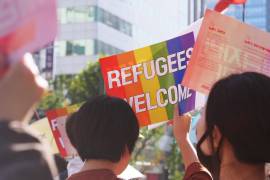Today was a bittersweet one for the ideals of diversity and inclusion in this country.
While the U.S. Supreme Court affirmed race conscious admissions in its 4-3 ruling upholding the University of Texas’ efforts to achieve equal opportunity in higher education by considering race as a factor in undergraduate admissions decisions, the Court also, with a 4-4 ruling in United States v. Texas, left in place a lower court decision that blocks President Obama’s programs to protect millions of undocumented immigrants from deportation and barriers to work.
We are deeply disappointed in the split decision, which highlights the need to have nine Justices on the Supreme Court. Millions of immigrants will continue to be prevented from reaching their full potential and will live in fear that they or their loved ones could be deported, with LGBT immigrants remaining particularly vulnerable.
Announced in November of 2014, Obama’s programs – Deferred Action for Parents of Americans (DAPA) and Lawful Permanent Residents (LPR) and an expanded Deferred Action for Childhood Arrivals (DACA) – granted temporary work authorization and protection from deportation to millions of undocumented immigrant parents of American citizens and lawful permanent residents and to undocumented immigrant youth who qualify.
Unfortunately, these initiatives never took effect after a federal district court in Texas ruled in favor of Texas and 25 other states in a lawsuit they filed to block implementation of the programs, a ruling subsequently upheld by the U.S. Court of Appeals for the Fifth Circuit.
President Obama’s initiatives were legal and just, which is why in March, Lambda Legal joined a diverse coalition of 326 immigration, civil rights, labor and social service groups led by the National Immigration Law Center in filing an amicus brief in this case, urging the Supreme Court to lift the injunction that blocked implementation of the executive actions.
Sadly, a Court that remains short-staffed as U.S. Senate leaders continue to block confirmation hearings for President Obama’s nominee, Merrick Garland, split evenly and allowed the Fifth Circuit ruling to stand, forcing millions of immigrant families back into the shadows and to lives of economic and emotional instability.





